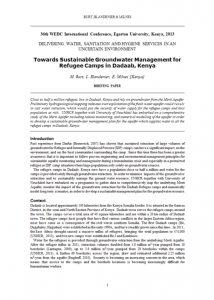 |
Sustainable Groundwater Management for Refugee Camps in Dadaab, Kenya (UNHCR and Université de Neuchâtel, 2013)Close to half a million refugees live in Dadaab, Kenya and rely on groundwater from the Merti Aquifer. Preliminary hydrogeological mapping indicates over exploitation of the fresh water aquifer could result in salt water intrusion, which would put the security of water supply for the refugee camps and host population at risk. UNHCR together with University of Neuchâtel has embarked on a comprehensive study of the Merti Aquifer including remote monitoring, and numerical modelling of the aquifer in order to develop a sustainable groundwater management plan for the aquifer which supplies water to all the refugee camps in Dadaab, Kenya.
|
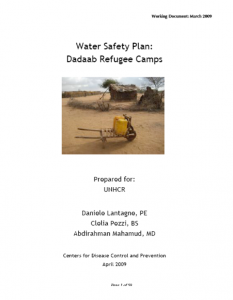 |
Water Safety Plan for Dadaab Refugee Camps (CDC, 2009)Water safety plan produced by CDC following a technical support visit to Dadaab in 2009. The report contains: An overview of Dadaab water supply system; Identification of hazards and risks; Control measures and prioritisation of risks; Sanitation and hygiene; and Conclusions.
|
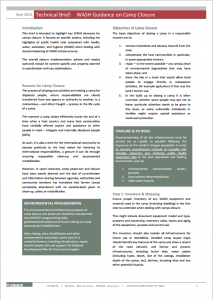 |
UNHCR WASH Guidelines on Camps Closure (UNHCR, 2014)This brief is intended to highlight key WASH elements for camps closure. It focuses on specific actions, including the highlights of public health risks associated with health, water, sanitation, and hygiene (WASH) when dealing with decommissioning of WASH infrastructures. The overall closure implementation actions and modus operandi should be context specific and properly planned in coordination with key stakeholders.
|
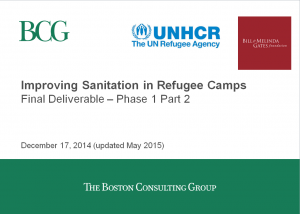 |
Improving Sanitation in Refugee Camps (UNHCR and Boston Consulting Group, 2015)The report examines the feasibility of a wide range of standard sanitation technologies in addition to sanitation innovations in refugee contexts (including miniaturized biogas, reinvented toilets, new processor technologies, SMS dispatching, pay per use toilets, sale of by-products). Technologies were evaluated based on upfront investment cost; technology viability, suitable size and transportability; flexibility and resilience; and value for money.
|
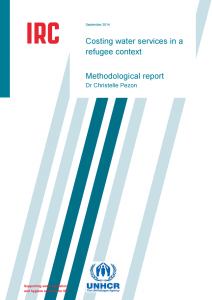 |
Costing Water Services in a Refugee Context (IRC and UNHCR, 2015)This report presents a methodology to cost water services that has been adapted from the life-cycle costs approach (LCCA) and looks at its applicability to refugee settings.
|
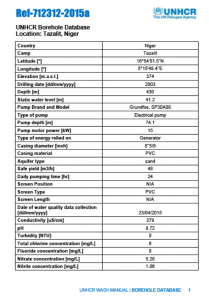 |
Tazalit Borehole Data – 23/04/2015Tazalit Country Niger Camp Tazalit Latitude [°] 16°54’01.5″N Longitude [°] 5°15’48.4″E Elevation [m.a.s.l.] 374 Drilling date [dd/mm/yyyy] 2003 Depth [m] 430 Static water level [m] 41.2 Pump Brand and Model Grundfos, SP30A08 Type of pump Electrical pump Pump depth [m] 74.1 Pump motor power [kW] 15 Type of energy relied on Generator Casing diameter [inch] […]
|
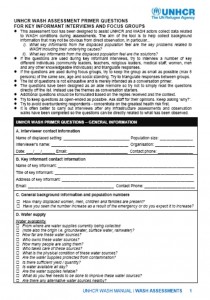 |
F-900/2015a UNHCR WASH Assessment Primer Questions (UNHCR, 2015)These WASH related primer questions have been designed to assist UNHCR and WASH actors collect data from key informants and focus groups during WASH assessments. The list of questions is not exhaustive and is merely intended as a conversation primer (aide memoire).
|
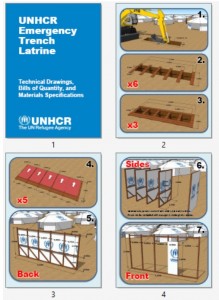 |
D-401/2015a Emergency Trench Latrine (Wood and Plastic with Raised and Lined Options) Design and BoQ (UNHCR, 2015)This document contains documentation to help UNHCR and WASH actors install emergency trench latrines in refugee settings. The package includes: Technical Drawings; Step by Step Construction Drawings; Bills of Quantity; Material and Workmanship Specifications; and Design Calculations.
|
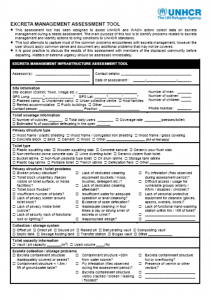 |
F-901/2015a UNHCR Excreta Management Assessment Tool (UNHCR, 2015)This assessment tool has been designed to assist UNHCR and WASH actors collect data on excreta management during a needs assessment. The main purpose of this tool is to identify problems related to excreta management and identify actions to bring conditions to UNHCR standards.
|
 English
English
